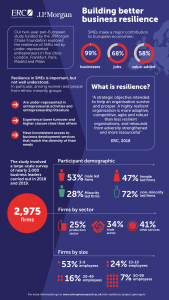Europe-wide study on ‘shock-proof’ firms ahead of Brexit
- Two-year project will learn lessons from 3,000 of Europe’s most resilient firms to spread best practice
- Focus on under-represented groups will seek to understand how entrepreneurs overcome barriers
- With 70% of European jobs in SMEs, study is seen as vital pre-Brexit to cushion economic fallout
A new study on business resilience in five European countries will draw up lessons on ‘shock-proofing’ firms on both sides of the Channel ahead of Brexit. With the prospect of the UK exiting the European Union next year without a trade deal still a possibility, the ability of small and medium sized enterprises (SMEs) to cope with adverse economic conditions is a hot topic for firms across the continent.
The research project, Building Better Business Resilience, will be led by academics at the Enterprise Research Centre, supported by the JPMorgan Chase Foundation. The researchers will survey 600 firms from across London to generate new data and insight into the characteristics and tactics of resilient firms. This survey will then expand to 2,400 small firms in Paris, Frankfurt, Milan and Madrid.
The ERC has published the project’s first output today [Thursday, 5 July] , drawing together key findings from the existing international literature on business
resilience as a base to build on. Small and medium-sized enterprises – firms with fewer than 250 employees – represent 99% of all businesses across Europe and provide around 70% of
employment. But despite their importance to national economies, little is known about how smaller firms bounce back from setbacks – and how lessons from those that do can be
spread across the business population. To tackle this knowledge gap, the two-year study will focus on the experiences of groups of people that have overcome structural barriers to build successful firms – including people with lower levels of education, disabled people and people from ethnic minority or migrant backgrounds.
Because these groups typically face obstacles to employment due to prejudice or discrimination, becoming an entrepreneur can seem like a more attractive option. But existing scholarship suggests that under-represented entrepreneurs face higher failure rates because of difficulties accessing financial and business advice, or a lack of peer support networks.
Nevertheless, those that overcome these challenges often display characteristics that can help them survive and thrive, including problem-solving skills and a strong
work ethic.
The researchers hope to learn lessons from the experience of under-represented business owners to develop new insights and a suite of practical tips relevant to the wider SME community.
The project involves researchers from universities in five European countries: the University of Nice in France; the Institut für Mittelstandsforschung (IfM) Bonn in Germany; University of Padova in Italy; IE University in Spain; and the Enterprise Research Centre at Warwick and Aston Universities in the United Kingdom.
Professor Stephen Roper, Director of the Enterprise Research Centre, said: “Business resilience is an incredibly important issue but one that’s currently little understood. This project will look at how business owners right across Europe cope with tough times and manage to grow in the face of adversity. “By focusing on entrepreneurs who face the biggest hurdles to start with, we
hope to generate new insights that will be useful for businesses as a whole. “This research is particularly relevant in the current climate, because changes in political structures and economic policy can have a big impact on the smaller firms that must operate in whatever framework confronts them. “Building firms that can withstand the economic weather is therefore a critical issue that demands serious study.”
Oliver Gregson, Head of Private Bank UK and Ireland at JP Morgan, said: “Starting and scaling a business has been a valuable route to drive the economy, jobs and wealth creation for many people and communities – but there are so many pitfalls along the way. “Through our corporate foundation, our firm works with entrepreneurs who have the will and the skills to succeed but who are competing on an uneven playing field. “Our foundation works to even those odds, open doors, provide support and networks for small businesses to benefit from more inclusive economic growth. “We’ve found that, to do this well, we need to invest in practical programming, designed on the basis of credible data, that delivers tangible results to entrepreneurs.
“We are keen to put the results of the upcoming survey in the hands of SMEs so they can put it to practical use.”
ENDS
Notes to editors
1. Infographic (hi-res AI, PDF and PNG format versions available on request)
About the Enterprise Research Centre
ERC is the UK’s leading independent research institute on the drivers behind the growth and productivity of small and medium-sized enterprises (SMEs). It is funded by the Department for Business, Energy and Industrial Strategy (BEIS), the Economic and Social Research Council (ESRC), Innovate UK, The Intellectual Property Office (IPO) and the British Business Bank (BBB).
ERC is producing the new knowledge around SMEs that will allow us to create a business-friendly environment nationwide, grounded in hard evidence. We want to understand what makes entrepreneurs and firms thrive so we can spread the lessons from best practice and make the UK a more successful economy. The Centre is led by Professors Stephen Roper of Warwick Business School and Mark Hart of Aston University, Birmingham. Our senior researchers are world-class academics from both Aston and Warwick Universities as well as from our partner
institutions which include Imperial College, Queens University Belfast and the University of Strathclyde.
https://www.enterpriseresearch.ac.uk












